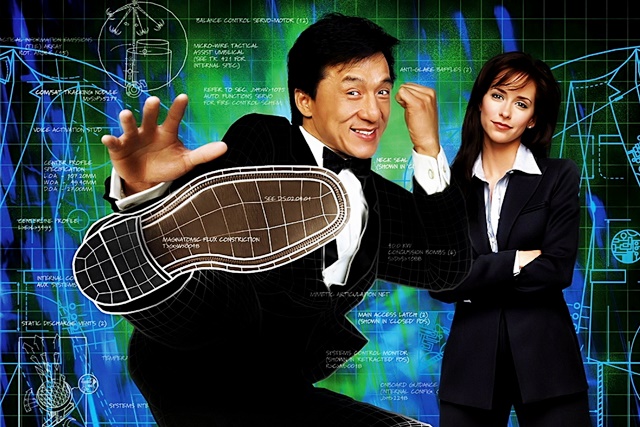
By Jae-Ha Kim
Chicago Sun-Times
September 22, 2002
Though Jackie Chan is hesitant to show off his dexterous martial arts moves when he’s not on set filming, he’s game for just about anything else. Last week, the popular actor helped Fox news anchor Tamron Hall celebrate her birthday by presenting her with a cake.
Later that day when a reporter asked him to sing, he broke into a pitch perfect rendition of “Always on My Mind” that was more Willie Nelson than Elvis Presley.
“I love country music,” Chan says, perched on chair at the Four Seasons Hotel. “I like rap music, too, but I can’t understand the words. With country music, I know what they’re saying and learn a little more English, too. I relate to the songs.”
Yes, Chan can sing. Quite well, too, as you’ll hear in his latest film “The Tuxedo” when he tackles a James Brown number. He also nails the godfather of soul’s fancy footwork.
In the film, which opens Friday at local theaters, Chan stars as Jimmy Tong, a lead-footed taxi driver hired to chauffeur a dapper secret agent. When the spy is injured, Tong dons his hi-tech tux, which makes it possible for him to dance like Fred Astaire, run like Carl Lewis and fight like, well, Jackie Chan.
This film marks a departure for Chan, who is known for doing all his own stunts. He still gets to show off his awesome moves, but “The Tuxedo” is filled with special effects–something that always piqued his interest, though he wasn’t sure he would ever include in his own films.
“If it wasn’t for the fact that this film was made by Steven Spielberg’s company [DreamWorks], I wouldn’t have done this,” says Chan, 48. “But I trust them. I wanted to do this movie because it was different from the scripts I usually get. My character wasn’t a policeman or a martial arts expert. In Asia, I made whatever movie I wanted to. But in America, all the scripts I receive are about the police, police, police! I read this script and thought it would be fun.”
An astute businessman, Chan says there already have been talks to film a sequel, but he wants to see how this one does at the box office first.
“I want to know how the audience reacts to this kind of movie,” he says. “I have to see if they like seeing special effects or if they’re disappointed. Then I’ll know the future of where I’m headed.”
These days, Chan can add entrepreneur to his resume. He opened Jackie’s Kitchen–a family-style Chinese restaurant–five years ago in Japan. South Korea will be the second country to open its doors to the chain in October. He hopes to open one of the first American version in Hawaii in the near future.
Besides his eatery, Chan has a line of clothing for men and women. For this interview, he has on a natty ensemble from his own line. His brown trousers are offset by a crisp striped, button-down shirt and tweed blazer–both with a gentle Mandarin collar.
“I combined Chinese and Western cultures for my clothing line and people seem to like it,” he says. “Michael Jackson called [my “Rush Hour” co-star] Chris Tucker and asked him to get him some of my suits. I met Tiger Woods and said, ‘Oh, it’s a great honor to meet you.’ He said he liked my suit. So then I said, ‘Nice to meet you.’ He said, ‘Great suit.’ I told him I’d make him one and then he got excited. I made him two.”
If he could whip up a state-of-the-art suit of his own that had all the functions of his celluloid tuxedo, Chan says he’d use it to go patrol for criminals every night.
“Then I would feel like I was really contributing something important,” he says. “I am an entertainer, but I don’t save lives.”
While many of his rabid fans already view him as a hero, Chan acknowledges he is fallible. Married since 1983 to Taiwanese film star Lin Fengjiao, with whom he has a teenage son, Chan said in 1999 that he “did something wrong” by having an affair with former Miss Asia, actress Elaine Ng, who later gave birth to their daughter. Ask him about this and he’ll politely decline to discuss it.
He doesn’t like to talk about his past, especially his well documented upbringing. At 7, he was indentured to the rigorous Chinese Opera Research Institute by his impoverished parents. For the next decade, he trained up to 19 hours a day to perfect his martial arts, acrobatics, dancing, singing and fencing skills. An avid Bruce Lee fan, he shyly points out that Lee didn’t perform his own somersaults in his films. Chan does.
He started his career as a stunt man earning $8 a day in Hong Kong. When he wasn’t getting whacked on the head, jumping off buildings and breaking his bones to make the lead actor look better, Chan was helping move around set equipment and cleaning up.
“Because I did these free things, the directors and producers began noticing me,” Chan says. “Every director began asking for me. They’d say, ‘I need that young guy tomorrow.’ If you work hard, everyone knows this. That’s how you earn success.”
Progressing to stunt director, he began acting when directors wanted to groom martial artists to become the new Bruce Lee. Lee’s serious demeanor and Chan’s more playful style didn’t mesh. By 1978, he had reinvented himself as a comic action star.
Pausing, Chan says, “One day, I really want to be known as an actor–not as a martial arts star or an action star, but a real actor like Buster Keaton or John Wayne or Fred Astaire. They are my heroes.”